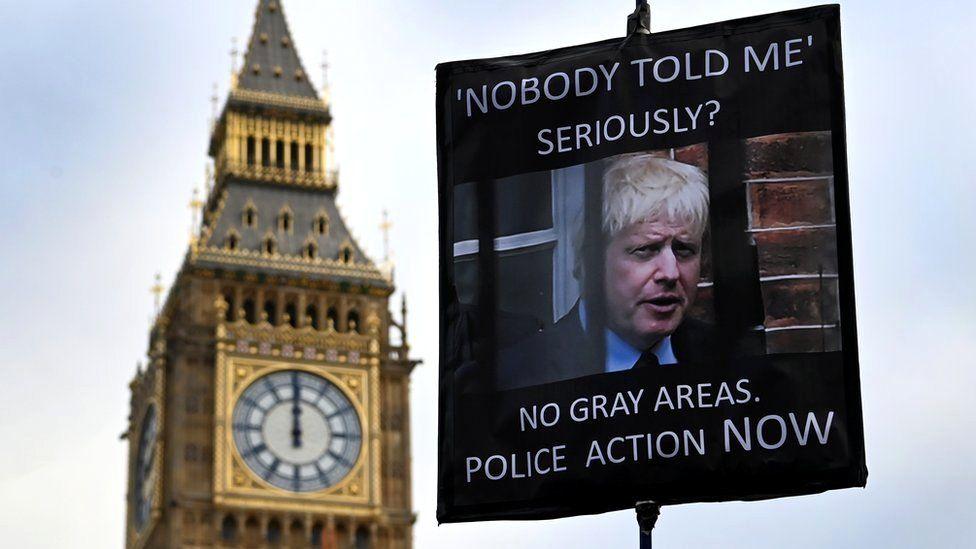British Prime Minister Boris Johnson is fighting for his job in a row over gatherings at his official residence allegedly in breach of his own Covid lockdown rules.
In a perilous moment for his leadership, Mr Johnson is accused of misleading the public and parliament about drinks parties that took place at 10 Downing Street in London.
He is not only facing calls to resign from opposition politicians, but a revolt among members of his own Conservative Party.
On top of the revelations about potentially Covid-breaching gatherings, he has faced pressure on other fronts too – including funding for a flat refurbishment and a row last year in which his government tried to save a Conservative MP who was embroiled in his own scandal.
Complicating things further, there has been a barrage of criticism from Mr Johnson’s former top adviser, Dominic Cummings, who has said the prime minister was warned about a drinks party in the Downing Street garden prior to the event.
Conservatives are now weighing up whether the man who helped win the Brexit vote and delivered a handsome majority at the last election is, in fact, expendable.
With the prime minister’s position looking increasingly fragile, let’s take a look back at how we got here – and where we may be heading.
In the spring of 2020, during England’s first Covid lockdown, Mr Johnson attended a “BYOB” (or “bring your own booze”) party in the Downing Street garden.
At the time, restrictions imposed by the government said that people could not leave their homes – or be outside the place they live – without a reasonable excuse. That included work (if you were unable to work from home), exercise and getting things like food and medicine.
The law also banned gatherings in a public place of more than two people, unless they were all members of the same household or the gathering was “essential for work purposes”.
About 30 people are understood to have attended the Downing Street garden party. However, lawyers have noted that the location is not a public space.
In a separate incident, a photo from May 2020 showed the prime minister and his staff with bottles of wine and a cheeseboard in the Downing Street garden. When asked about it he said people were “at work talking about work”.
The prime minister has apologised for “misjudgements that were made” and said he was not aware the event he attended on 20 May was a party, but had “believed implicitly” it was a work event.
Several other gatherings have been reported in late 2020 and in April 2021, including two parties involving Mr Johnson’s staff held the night before Prince Philip’s funeral – at a time when indoor mixing was banned.
Mr Johnson was not at either party and his office later apologised to the Queen following the reports.
But the revelations and his handling of the affair has angered the public and politicians on all sides.
An inquiry is under way to establish “a general understanding of the nature” of the Downing Street gatherings and whether any “individual disciplinary action” should be taken.
The report, led by senior civil servant Sue Gray, is likely to be a largely factual account and will not rule on whether lockdown laws were broken.
However, if her probe uncovers evidence of potentially criminal behaviour, it will be referred to the police.
While Ms Gray’s professionalism has been praised, she has the difficult task of investigating her bosses – including the prime minister.
Mr Johnson has been calling for MPs to wait for the outcome of Ms Gray’s report before passing judgment on his behaviour.
In December 2021, the UK’s top civil servant Simon Case stepped down from leading this same inquiry into the parties when it emerged one had been held in his own office.
Yes. Unlike the US, the UK does not directly elect its prime minister so, as leader of the ruling Conservative Party, Mr Johnson depends on the continued support of his MPs.
In the face of accusations such as misleading parliament and members of the public, Conservative MPs who question Mr Johnson’s ability to lead the country can submit letters of no confidence in him.
If 54 MPs within the prime minister’s own party submit letters, it would lead to a confidence vote, which in turn would trigger a leadership contest if the prime minister loses that vote.
Other prospective leaders will then need to be nominated by at least two fellow Conservative MPs.
If there are several candidates, they will be whittled down to two individuals through a series of ballots.
Candidates may withdraw between rounds, and if all but one withdraw, the one remaining candidate will become leader with no need for a vote from members.
This video can not be played
Only a handful of Conservative MPs have publicly declared no confidence in the prime minister, but others are believed to be privately considering submitting letters and one MP told the BBC they thought the threshold could soon be reached.
While a few Conservative MPs have joined the chorus of opposition parties in urging Mr Johnson to step down, most have publicly said they are prepared to await the conclusion of Sue Gray’s investigation before deciding how to proceed.
Also, just as MPs can submit letters of no confidence, they can withdraw them, and it is not clear at this stage how many will go through with it when the time comes.
The inquiry, meanwhile, will not offer a judgment of the prime minister or his behaviour, but instead simply set out the facts.
Ms Gray’s probe, the results of which are expected sometime next week, may conclude that there is no incontrovertible evidence that Mr Johnson was – explicitly – told the drinks event in his garden was a breach of the rules.
But Conservative MPs will be closely watching what voters think, with the prime minister’s poll ratings already falling.
Tory MPs moving against PM compared to jilted lover
In the name of God go, David Davis tells PM
Tory MP Christian Wakeford defects to Labour









